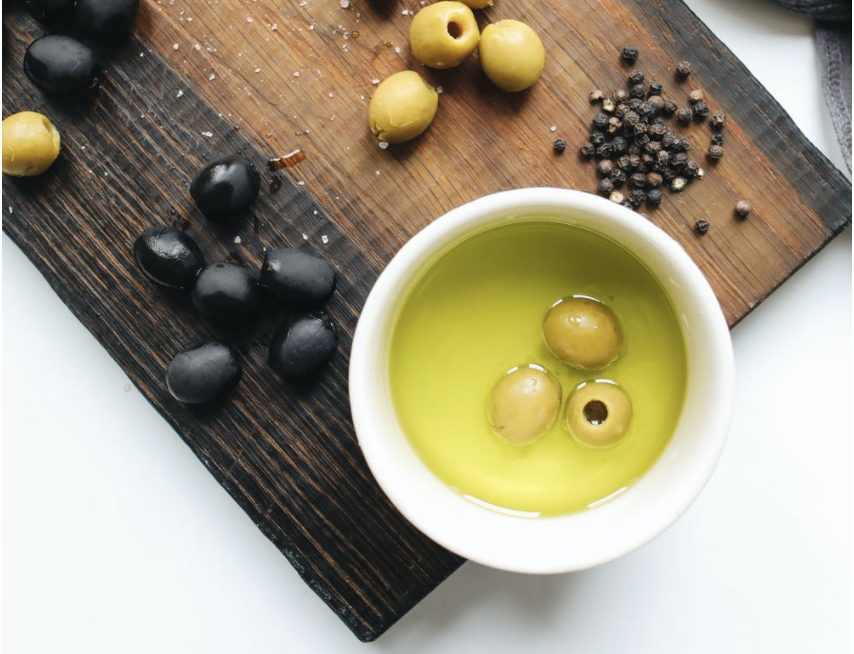
The number of different cooking oils available to us these days may be overwhelming if we don’t know what to look for. Do you need something with a high smoke point? Are you watching your cholesterol? Do you want something neutral flavoured, or do you want the oil to infuse some flavour into your dishes?
There are certainly a few different factors to consider when purchasing an oil that is intended to be used for cooking. We will go over a few of the most popular options so that you can make an informed choice at the grocery store. After all, cooking oil is something we will consume in most of what we eat – and we should know what we’re putting into our bodies!
Olive Oil
Extra virgin olive oil is revered as one of the best oils to use, for its abundance of healthy fats. It contains monounsaturated fats and some polyunsaturated fatty acids, and there are lots of studies out there that have found a link between olive oil and overall better health. This oil comes with a couple of significant downsides, however. It has a low smoke point, meaning that you will not want to cook anything that requires higher than medium heat, otherwise it will break down and start smoking. The other issue with most of the brands of olive oil that we have to choose from in North America are unfortunately either very low in quality, or even “fake.” Doing some research about olive oil reveals the sad truth about an industry where fraud runs rampant. It is common, even for bottles labeled as “extra virgin,” to be diluted or cut with other lower-quality oils such as sunflower. It is even possible that you are consuming non-virgin olive oil that has a couple of drops of chlorophyll in it to give it colour, plus some beta carotene to give it a more fruity taste. When shopping for Italian olive oils, it is important to look for the specific city where it is made, and the bottle should have a date on it as well. It is common for rancid 2-3 year old olive oils to be sold on the shelves! Remember, the less you pay, the less likely that it is authentic.
Coconut Oil
This may be the most controversial of the oils. A few years ago, coconut oil was heralded as a miracle product to be used not only in food, but slathered on the hair and skin as well. The main point of conflict is the type of fat content it has in it. Coconut oil is largely made up of saturated fat, and it is widely accepted that for this reason, it’s best to look elsewhere for a go-to cooking oil. Not everyone agrees that such a concentrated source of saturated fat is a no-go for health, but many experts argue that replacing foods that are high in saturated fat with healthier options can lower blood cholesterol levels.
Avocado Oil
We can’t hide our love for this oil… so we won’t try to! Avocado oil is a great choice. Like extra virgin olive oil, it is unrefined. But the best part is it’s higher smoke point, which makes it a great choice for cooking things like fried eggs and stir frys. Although it is not a neutral oil, avocado oil has a mild flavour that we have had no issues with. It does not take over the taste of the food, so it is very versatile! This oil contains both monounsaturated and polyunsaturated fatty acids, as well as vitamin E. It’s saturated fat content is low, at about 12%, on par with olive oil. For comparison, coconut oil is a whopping 90% saturated fat.
Peanut Oil
Peanut oil is widely used around the world but is most common in Chinese, South Asian and Southeast Asian cooking. It tends to have a relatively neutral flavour, and it is a popular choice for frying foods due to its high smoke point. Peanut oil is a good source of the antioxidant vitamin E, which may help reduce heart disease risk factors. However, we wouldn’t say that this oil is at the top of our list. It is very high in pro-inflammatory omega-6 fatty acids and is prone to oxidation, which may increase the risk of certain diseases.
Canola Oil
There’s no beating around the bush here – we are not fans of the most commonly used household oil! The reason why this oil is so popular is its affordability, neutral taste, and high smoke point. Our main issue with it is just how heavily chemically processed it is; the end result is an oil with very little nutrients, some trans fats, and trace amounts of hexane, a chemical derived from petroleum. There are certainly much better options (see avocado oil!) out there that will meet your needs.
Sources: https://time.com/5342337/best-worst-cooking-oils-for-your-health/ https://www.youtube.com/watch?v=bCZYc1fEJt0 https://www.healthline.com/nutrition/is-canola-oil-healthy#nutrition
Leave a Comment
You must be logged in to post a comment.



0 Comments